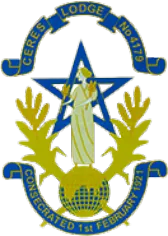W Bro Stephen Powell SLGR, a member of Islington Lodge and President of the London Ex-Boxers’ Association (LEBA) reports…
Islington Lodge No 1471 has now been dedicated as a new Special Interest Lodge for Boxing. Freemasons and boxers have a history going back centuries.
On 28th October 1911, “Boxing News” described an event in Scotland where Jack Johnson, the Heavyweight Champion of the World, was initiated into a Masonic Lodge (Forfar and Kincardine No 225). At the time, Johnson had fled the USA to avoid arrest for a breach of the American ‘Mann Act’ which forbade men from taking women into another state, for marriage or other delights, and instead embarked on a European tour of exhibition bouts.
Jack had been giving Exhibitions in Newcastle when he was invited by another participant to Scotland to become a Mason. Whilst Johnson had not been arrested or convicted, the matter of his evading the US legal establishment caused consternation with the Grand Lodges of America and Scotland. The Lodge was ordered to return Johnson’s initiation fee and take him off the register. But the Lodge resisted, sticking by their new Brother, who was subsequently suspended for 18 months. To this day Johnson’s name and initiation details appear in the ancient minutes; their support vindicated by his subsequent pardon.
Johnson’s story is now a well-told one, an African-American fighting discrimination, accepted into Freemasonry and supported by his new masonic family. Other notable masonic boxers include:
Daniel Mendoza: Long before Johnson, pugilist Daniel Mendoza from Whitechapel, was initiated into English Freemasonry in around 1787 to 1788. As a bare-knuckle fighter, he claimed the Middleweight title in 1789, and the “All English” title a year later. Mendoza led a chequered life and, like Johnson, fell foul of the law on numerous occasions, yet his masonic Brothers (according to his memoirs) remained loyal. On one occasion whilst languishing in the debtors’ prison, his Lodge even bailed him out, paid his debts and bought him a house!
Billy Walker: My dear friend, W Bro Brian Wright PAGDC, found cause to interview the “Golden Boy” of British Heavyweight Boxing for a book on Freemasonry, ‘The Master’s Chair’. Over tea, Billy told Brian how he boxed for West Ham ABC, won the ABA Heavyweight Championship in 1961 and was part of the English team which beat the USA 10-0 in a televised international tournament , with Billy knocking 6’ 4’’ Cornelius Perry ‘sparko’ with “the hardest punch I ever threw”, completing the whitewash in the tenth bout. Now big box office, Billy had a successful professional career – even boxing Henry Cooper for the British and Empire Heavyweight title. In 1964, he was initiated into St. Katherines Lodge No 5376 (Province of Essex). He is still in great shape and can still be seen around boxing events in his role as an inspector for the British Boxing Board of Control.
Freddie Mills: A former light-heavyweight Champion of the World, Fred won the British title in 1942, later adding the European title and World Championship in 1948. He was an all action ‘value for money’ fighter which made him very popular with the British public. In retirement, he became a promoter and manager, and due to his popularity and celebrity diversified into the world of stage, film and TV. Freddie was initiated into Chelsea Lodge No 3098.
Pat Floyd: Hugh Patrick ‘Pat’ Floyd was a celebrated English amateur boxer, initiated into Brixton Lodge No 1949 in 1942. A three-time ABA Heavyweight Champion (1929, 1934, and 1935), he had represented England and GB several times, and won the coveted Golden Gloves Belt. In 1946, Pat returned to boxing to stop a hotly fancied French boxer from winning the prestigious – and ‘British’ – ABA Championship Cup tournament, with Pat winning his fourth ABA championship at the Royal Albert Hall, beating his French opponent on points. In retirement, Pat coached at the Royal Masonic School for Boys under the banner of the Royal Masonic ABC, became a professional referee and, latterly, President of The London Ex-Boxers Association (LEBA), where he was greatly admired and respected. Pat likened the camaraderie at LEBA to that of a Masonic meeting, both inhabiting respect and fraternal love; LEBA’s motto being “It’s Nice to Belong”. Pat dreamed of forming a “Boxing Lodge”, and some 35 years after his passing, Floyd’s ‘Dream’ has finally come to fruition.
It’s fitting that Islington Lodge No 1471 should become a boxing Lodge: the London Ex-Boxers Association (LEBA) was founded in Islington; to aid ex-boxers and their families through a Benevolent fund. Over the years, LEBA has benefited from charitable donations from London Lodges, particularly Green Room Lodge No 2957. One member of this Lodge was Bruce Wells, the 1953 and 1954 ABA Light Middleweight Champion, 1953 European Amateur Boxing Champion and Golden Gloves Belt winner, with many of the donations made in his memory. His sons, Peter and Bruce Jnr, are past masters.
Islington Lodge warmly welcomes fellow Masons with an interest in boxing to join or visit the Lodge. They will also introduce prospective members to LEBA or a convenient local EBA nearer to their home.

This article is part of the Arena Magazine, Issue 53 December 2023 edition.
Arena Magazine is the official magazine of the London Freemasons – Metropolitan Grand Lodge and Metropolitan Grand Chapter of London.
Read more articles in the Arena Issue 53 here.

